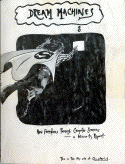
|
||||||||||||||||||||||||||||||||||||||||||||||||||||||||||||
|
After a week of watching the amalgamation of the 100 most followed twitterers, a few observations, and no conclusions. 1. I still hope that by amalgamating this group it will change it, make the people with all the followers more aware of how they look to their followers, and may inspire some movement. 2. There are a fair number of robot feeds in the top 100, channels that are just pushing links to stories that make money for the owners. Examples: @time, @guardiantech, nytimes, @techcrunch, @mashable. 3. The cutest of the top 100 is @anamariecox. Imho. Ymmv. 4. There's an awful lot of classic What I Had For Lunch type tweeting. The biggest offenders, the three Twitter guys, @ev, @biz and @jack. Same with @aplusk and the rappers and sports stars. They tweet infrequently and when they do they're borrring. 5. @oprah's fans got excited about Twitter for nothing. She's followed by 922K, follows 11 (all of them superstars) and has updated 38 times. 5a. Maybe something the stars aren't aware of or prepared for is how visible and transparent they are. In the non-twitter world we can't tell how much of their fan mail they respond to, or who they talk with and what they say when they're being themselves. On Twitter, we can. This might not be what they intended. 6. @timoreilly wins the prize for effort among the twitter superstars. It's pretty obvious he's doing it himself, or as obvious as it can be (he might pay someone to make it look like he's doing it himself). 7. I think people who tuned into it are as bored as I am. The usage was huge in the first few days, about 50K hits per day, but it's tailed off a lot now. For the last couple of months I've done a podcast every Sunday with Jay Rosen. Three Sundays ago he had a great idea, every week let's choose someone to honor as a source of inspiration to the new journalism we see emerging. We alternate weeks, the first time he chose Edison Carter, the reporter on the Max Headroom TV series of the 80s. Then I chose Jon Postel, the man behind many of the open protocols of the Internet, and the keeper of its spirit, who passed away just as the Internet was becoming a huge societal force. And last week Jay chose Josh Marshall of Talking Point Memo. Now it's my turn. I gave it a lot of thought. It seems we're doing the Yin and the Yang. Jay comes at it from the journalism side, and I approach from the tech side. This week I will continue in this mode. My choice is Ted Nelson.
There were a small number of hippie computer types, not much like the guys who wore the nerd pocket protectors. We got dates, were gregarious and outgoing, liked to do drugs, and music -- and thought computers fit into the groovy lifestyle. It was kind of a lonely thing. The hippies didn't know what to make of us and neither did the nerds. But when Nelson's book crossed my path, and the paths of people like me, it gave us a sense that others saw it the same way. Today, few question that computers are used for thinking and collaboration, although the people who say bloggers will never do the work of journalists sound a lot like the people who questioned computers as human tools in the 70s. The venture capitalists and entrepreneurs of Silicon Valley don't understand why someone would develop technology without a plan to get rich from it, but the hippie tech guys don't have a problem with that. Changing the world for the better is a good enough cause. Helping people share their knowledge and insight is most of what computers do, most people who use them have no hope of getting rich from using them, but they do it anyway. So while the attention focuses on the people who make the money, the real action is with the people who learn and teach and share with them. Further, Nelson believed, as I did and still do, that computers were primarily tools to connect up to networks. Later Sun Microsystems would codify this with the slogan "The Network is the Computer." For those who have read Nelson's book, you must have guessed that at some point I will choose Doug Engelbart, and you would be right. But I first learned of Engelbart's work through Nelson's book. I met Nelson before I met Engelbart. Neither of these heroes are perfect, but then heroes who are real people never are. But Nelson's work is monumental, it gave hope and confidence to a generation of people who did make a huge difference. That's good enough to be my choice for this week. |
"The protoblogger." - NY Times.
"The father of modern-day content distribution." - PC World.
One of BusinessWeek's 25 Most Influential People on the Web. "Helped popularize blogging, podcasting and RSS." - Time.
"The father of blogging and RSS." - BBC.
"RSS was born in 1997 out of the confluence of Dave Winer's 'Really Simple Syndication' technology, used to push out blog updates, and Netscape's 'Rich Site Summary', which allowed users to create custom Netscape home pages with regularly updated data flows." - Tim O'Reilly.
My most recent trivia on Twitter. On This Day In: 2008 2007 2006 2005 2004 2003 2002 2001 2000 1999 1998 1997. |
|||||||||||||||||||||||||||||||||||||||||||||||||||||||||||
|
© Copyright 1997-2009 Dave Winer. Previous / Next |
||||||||||||||||||||||||||||||||||||||||||||||||||||||||||||
 Nelson wrote a
Nelson wrote a 

